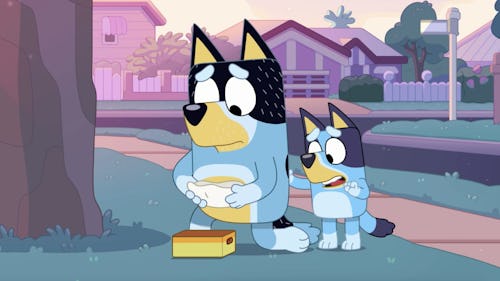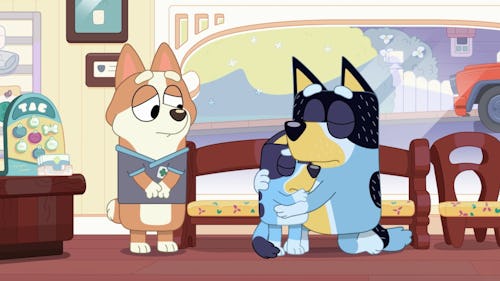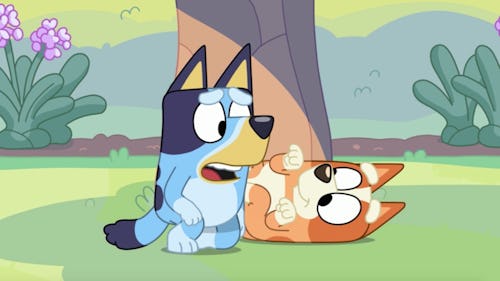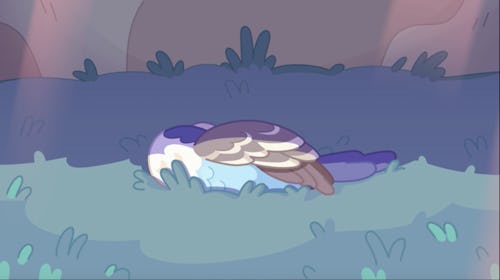
Bluey may be a cartoon about talking dogs, but that doesn’t mean it doesn’t tackle some very heavy, even grown-up subject matter. From aging parents to miscarriage to infertility, the series has done a tremendous job encapsulating very big ideas in 7-minute episodes. One Bluey episode about death — yes, we’re going there — shows how children understand and process this chapter of life, and it’s truly beautiful and surprisingly uplifting.
“Copycat” is a Bluey episode about death.
The Season 1 episode begins with Bluey playfully mimicking her dad throughout the morning. From the moment he wakes up through to his morning walk, she has fun copying his every word and action, until she notices a little budgie — a common parakeet native to Australia — lying on the ground. Bandit determines that they should take the little guy to the vet to see if they can get it help.
Carefully putting the tiny bird into a shoe box with a cozy tea towel, the pair drive to the vet and wait. When the nurse receptionist comes back, it’s bad news: the budgie died.
“Oh. OK,” Bluey says flatly. Bandit gives her a comforting hug and they drive home.
“Dad?” she says from her car seat. “I don’t want the budgie to have died.”

“I know. Me neither,” he replies. “But there’s nothing we can do: it’s out of our hands.”
“Are you sure he won’t get better?”
“Yeah, I’m sure.”
When they get home, Bluey is greeted with a sympathetic hug from Chilli. Bingo, 4, is being carried by Chilli, and seems relatively unaware of the situation, though she is clearly picking up on the mood of the people around her.
Later that day, Bluey ropes Bingo, who remains blithely unaffected by the day’s events, into a game.
“Can you pretend to be a budgie?” she asks.
“OK!” Bingo says excitedly. “Tweet tweet!”
What follows is a word for word, beat by beat recreation of Bluey’s sad morning with her dad, in which she mimics everything Bandit had said and done, down to tiny little details that seemingly had nothing to do with the fate of the budgie, like yelling at a careless driver on the way to the vet and looking both ways before crossing the “street.”

She carries Bingo/the budgie to her mum inside where Chilli takes the role of the nurse receptionist. After a few moments of waiting, Chilli comes out all smiles. “I’ve got good news! your bird is OK!” she says cheerfully.
“No, no, mum,” Bluey says in a brief moment of breaking character. “You have to pretend it’s bad news: that the budgie’s dead.”
Chilli’s uncertain, but goes with it. Bingo, however, didn’t get the memo and bursts out of the “office” tweeting and flapping her “wings.”
“This isn’t how you wanted the game to go,” Chilli says warmly to Bluey.
“No,” she says glumly, but then brightens. “It’s OK. There’s nothing we can do; it’s out of our hands.”
The episode concludes with both Bluey and Bandit smiling at the realization that Bluey has finally stopped copying him, unaware that that’s exactly how she’s managed to process this sad event.
Children understand and cope with death through play.
Unsurprisingly, Bluey has drawn from real-life child psychology in their approach to this episode. Bluey’s reenactment of the budgie dying is actually an excellent — and common — processing tool for children, especially if it’s their first close encounter with mortality. Death itself might be too big for anyone to truly be able to wrap their heads around, but the events surrounding it can be knowable, and make children feel better about the aspects of it they can’t undrestand. Even kids who haven’t seen death face to face might seem to have an obsession with death and, rest assured, it’s very normal.
Bluey and Bingo’s ages explain their different behaviors in the episode.
And just as Bluey and Bingo’s ages — 6 and 4 in this episode — are indicative of the way they play from a developmental point of view, so too does it inform how they process the death of the budgie. Bluey is just the right age to begin to understand death as permanent and irreversible. Though there’s a final glimmer of hope that the bird will come back from death, which is also for this cusp age, she understands that the budgie is not coming back.

Bingo, on the other hand, at 4 years old, is at a different developmental age than her sister. When the family is mourning the bird in a group hug, she seems a bit aloof and maybe even a little confused. Afterwards, she is unfazed by her sister’s sadness and is just happy to be asked to play. When her “character” is supposed to die during their game, she gets up again and starts tweeting: she’s too young to get death as permanent.
Other Bluey episodes deal with death and loss as well.
While none of these episodes are as overt as “Copycat,” a sense of loss or mortality can be found in other episodes as well. In “Granddad,” Chilli expresses vulnerability about the idea of losing her father, who’s just dealt with a health scare. “Play” arguably has a reference to miscarriage. “Flat Pack” plays with the idea of an afterlife where those who have died look after loved ones from a beautiful place above it all.
“Camping” is about losing childhood friends, but could easily be taken for a metaphor for death when Chilli tells her daughter “Sometimes special people come into our lives, stay for a bit, and then they have to go. [It’s sad.] ... But the bit where they were here was happy, wasn’t it? Maybe that makes it all worth it.”
0 comments:
Post a Comment